| Srl | Item |
| 1 |
ID:
149284
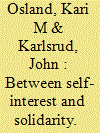

|
|
|
|
|
| Summary/Abstract |
Norway has been a firm supporter of, and contributor to, UN peacekeeping operations. However, while increasing its financial support since the end of the Cold War, Norway has significantly downscaled its troop contributions to the UN, focusing on NATO operations. Rather than interpreting this as lessened interest in the UN, we point out that support and commitment cannot be measured solely in numbers of troops deployed. Norway’s commitment to UN peacekeeping should be understood as part of its strategic culture, here read as a synthesis between self-interest and solidarity, and between the UN and NATO. This article details the institutional, political and material challenges and opportunities for renewed engagement in UN peacekeeping.
|
|
|
|
|
|
|
|
|
|
|
|
|
|
|
|
| 2 |
ID:
168967
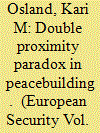

|
|
|
|
|
| Summary/Abstract |
This contribution increases the understanding of the EU's role in post-conflict settings by exploring perceptions of EULEX by local rule of law experts. Drawing on critical peacebuilding and the decline of normative power Europe literatures, we develop an analytical framework, underlining the importance of the intention–implementation gap and the implementation–perception gap in understanding how EU missions are perceived. By comparing local expert narratives to those of EULEX judges, prosecutors, and legal officers, we contend that the core problem for the negative perception of the mission results from what we call the double proximity paradox in peacebuilding. The first paradox is one of implementation and transpires when an actor commits substantial resources to address structural problems in a post-conflict territory due to its centrality for its own interests, but fails to uphold its commitment as its immediate interests can only be achieved through agents who contribute to these problems. The second paradox relates to perception and transpires as high commitments raise expectations of structural impact. The visibility of the actor's investment makes any implementation failures more tangible. The actor is therefore, paradoxically, the most open to criticism in a territory where it is doing the most.
|
|
|
|
|
|
|
|
|
|
|
|
|
|
|
|
| 3 |
ID:
053104
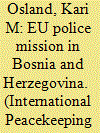

|
|
|
| 4 |
ID:
178522
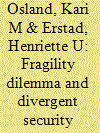

|
|
|
|
|
| Summary/Abstract |
Despite an exponential increase in international resources devoted to the Sahel, the situation on the ground continues to deteriorate. This is largely due to the so-called “fragility dilemma”, faced by fragile states that are in critical need of external assistance, but have limited absorption capacity and are governed by sitting regimes that dictate the terms and upon which external actors must rely. This dilemma has contributed to an increasing divergence between a state-centric regional and a people-centric transnational security complex. In particular, a heavy-handed approach to violent extremism and external policies aimed at curbing irregular migration have had a number of unintended consequences, disrupting livelihoods and further exacerbating instability in the Sahelian states.
|
|
|
|
|
|
|
|
|
|
|
|
|
|
|
|
| 5 |
ID:
177758
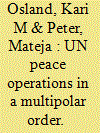

|
|
|
|
|
| Summary/Abstract |
UN peace operations need a new peacebuilding agenda that acknowledges both the transboundary nature of conflict drivers and the multipolar nature of the global order. This means casting aside the current stabilization approach, but also abandoning the pursuit of liberal peacebuilding of the unipolar era. Such a conflict transformation agenda would require UN peace operations to prioritize the rule of law and bottom-up approaches, thus creating the potential to be embraced by a much broader range of member states. In this article, we bring liberal peacebuilding critiques into a discussion with debates on the nature of the global order. Liberal peacebuilding critiques are rooted in the bottom-up problematization of international interventions and show what kind of peacebuilding is desirable. Conversely, the debates on the multipolar nature of the global order expose the top-down constraints as to what kind of peacebuilding is feasible.
|
|
|
|
|
|
|
|
|
|
|
|
|
|
|
|